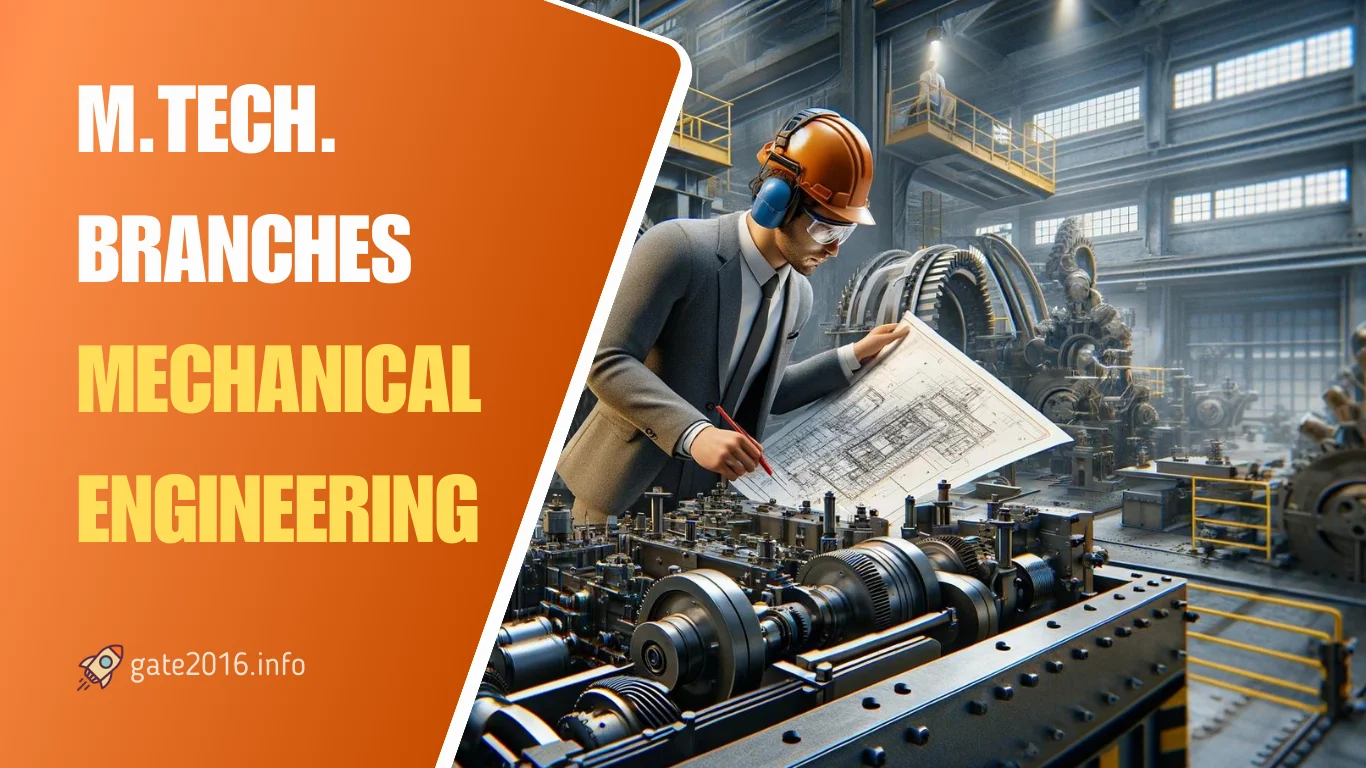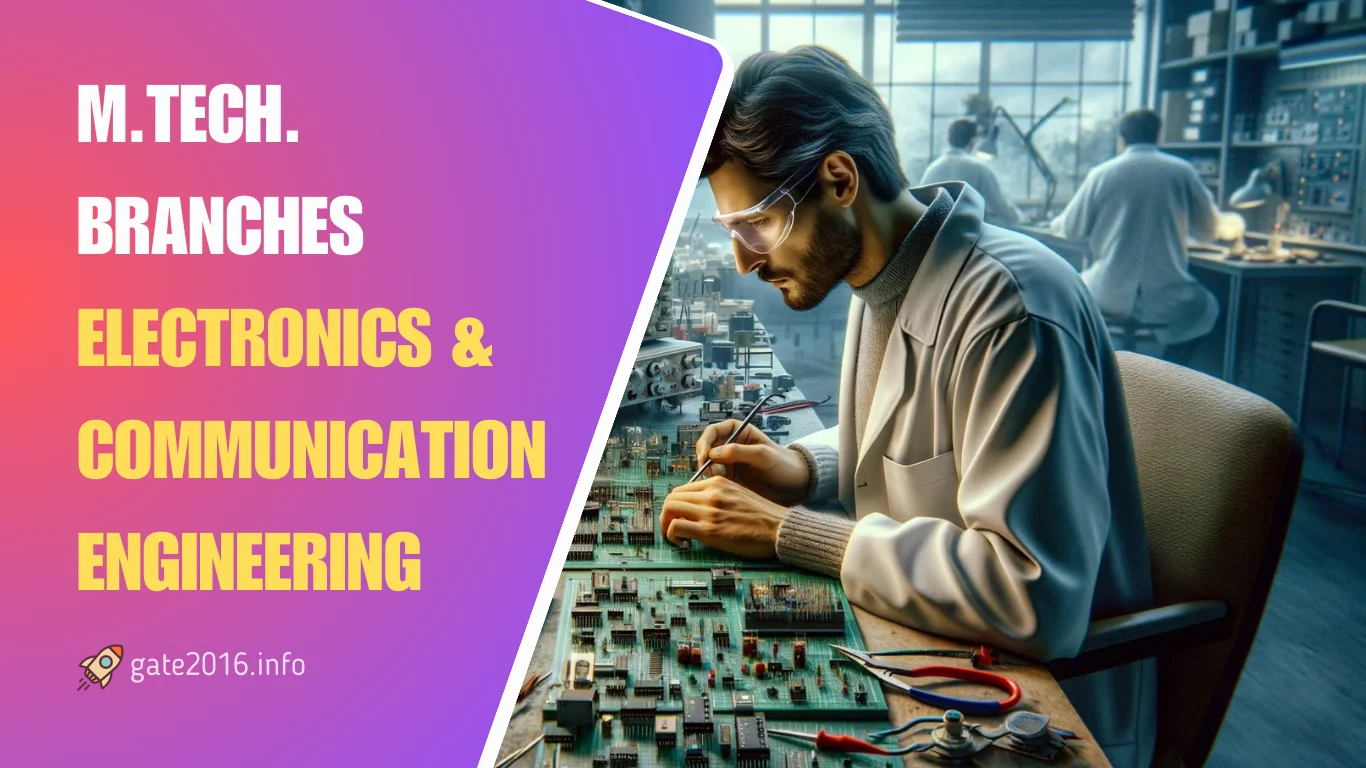Advertisements
Ratings
“What are the name of branches in m. tech. for electrical & electronics engineering?
What are the name of specializations in m. tech. for eee?
You all must have this kind of questions in your mind. Below article will solve this puzzle of yours. Just take a look.”

M Tech Branches: EEE – In the rapidly evolving world of engineering, Electrical & Electronics Engineering (EEE) plays a pivotal role in shaping technological advancements.
Pursuing a Master of Technology (M.Tech) in EEE offers students the opportunity to delve deeper into the intricacies of electrical systems, electronics, and power generation.
This article aims to provide a comprehensive understanding of the M.Tech program in EEE, covering its core areas of study, curriculum structure, career opportunities, admission process, benefits, challenges, and future prospects.
Contents
- Understanding M.Tech in EEE
- M.Tech. Course Details: Electrical & Electronics Engineering (EEE)
- M.Tech. Branches: Electrical & Electronics Engineering (EEE)
- Core Areas of Study
- Curriculum and Course Structure
- Career Opportunities
- Admission Process
- Benefits of Pursuing M.Tech in EEE
- Challenges and Considerations
- Future Prospects
- Conclusion
- M.Tech. Branches EEE FAQs
- M.Tech. Total Information & Guidance
Understanding M.Tech in EEE
Master of Technology in Electrical & Electronics Engineering (M.Tech EEE) is a postgraduate program designed to equip students with advanced knowledge and specialized skills in the field of electrical engineering, electronics, and related areas.
The program focuses on imparting theoretical knowledge, practical skills, and research capabilities to address the challenges and opportunities in the diverse domains of EEE.
M.Tech. Course Details: Electrical & Electronics Engineering (EEE)
| Degree | Masters |
| Full Form | Master of Technology |
| Duration | Course Duration of Master of Technology [M.Tech.] is 2 Years. |
| Age | No specific age limit |
| Minimum Percentage | 50-60% in Bachelor’s Degree |
| Subjects Required | B.Tech. / BE / MCA / M.Sc. / Other equivalent degrees |
| Average Fees Incurred | INR 25,000 – 2 L per annum |
| Similar Options of Study | ME, MS |
| Average Salary Offered | INR 5 L – 7 L per annum |
| Employment Roles | Senior Engineer, Senior Manager, Management Trainee, Senior Software Engineer, Software Engineer, Design Engineer, Assistant Professor, Postsecondary / Higher Education, Software Developer, Sr. Software Engineer / Developer / Programmer, etc. |
| Placement Opportunities | ISRO, HSBC, Samsung, Intel, Microsoft, Google, Apple, Flipkart, Amazon, Wipro Technologies Ltd., Tata Consultancy Services Limited, Infosys Limited, International Business Machines (IBM) Corp., Cognizant Technology Solutions Corp, Wipro, HCL Technologies Ltd. etc. |
M.Tech. Branches: Electrical & Electronics Engineering (EEE)
IISc Bangalore
| Core Branch | Inter-disciplinary / Other Branches |
|---|---|
| Electrical Engineering | Computer Systems |
| System Science and Automation | Computational Science |
| Signal Processing | Aerospace Engineering |
| Sustainable Technologies | |
| NanoScience and Engineering | |
| Autospheric and Ocean Science |
IIT Bombay
| Core Branch | Inter-disciplinary / Other Branches |
|---|---|
| Control and Computing | Corrosion Science and Engineering |
| Power Electronics and Power Systems | Biomedical Engineering |
| Microelectronics | Dynamics and Control |
| Electronic Systems | Geo Informatics and Natural Resources |
| Energy Systems Engineering | Industrial Engineering and Operational Research |
| Communication Engineering | Nuclear Science |
| Material Science |
IIT Madras
| Core Branch | Inter-disciplinary / Other Branches |
|---|---|
| Communication and signal Processing | Aerospace Engineering |
| Power Systems and Power Electronics | Biomedical Engineering |
| Microelectronics and VLSI Design | Industrial Mathematics and Scientific computing |
| Control and Instrumentations | Clinical Engineering |
| Microelectronics | Functional Materials and Nanotechnology |
IIT Delhi
| Core Branch | Inter-disciplinary / Other Branches |
|---|---|
| Control and Automation | Applied Research in Electronics |
| Integrated Electronics | Energy Studies |
| Power Electronic, Electrical Machines and Drives | Instrument Technology |
| Power Systems | Opto-Electronics and Optical Communication |
| VLSI Design Tools and Technology | |
| Industrial Engineering |
IIT Kharagpur
| Core Branch | Inter-disciplinary / Other Branches |
|---|---|
| Visual Information and embedded systems | Embedded Controls and Software |
| Telecomunication Systems | Infrastructure Design and Management |
| RF and Microwave | Industrial Engineering and Management |
| Machine Drives and Power Electronics | Computer Science and Data Processing |
| Microelectronics and VLSI Design | Medical Imaging and Informatics |
| Control System | Energy Science and Engineering |
| Power and Energy Systems | Instrumentation and Signal Processing |
| Biomedical Engineering |
IIT Roorkee
| Core Branch | Inter-disciplinary / Other Branches |
|---|---|
| Power Systems | Geo Informatics Engineering |
| Systems and Control | Solid State Electronic Materials |
| Electric Drives and Power Electronics | Alternate Hydro Energy Systems |
| Instrumentation and Signal Processing | Environmental Management of Rivers and Lakes |
IIT Kanpur
| Core Branch | Inter-disciplinary / Other Branches |
|---|---|
| Microelectronics and VLSI | Aerospace Engineering |
| Power Engineering | Biological Sciences and Bio Engineering |
| RF, Microwave and Photonics | Geo informatics |
| Signal Processing, Communication and Networks | Photonics Science and Engineering |
| Control and Automation | Nuclear Engineering |
IIT Guwahati
| Core Branch | Inter-disciplinary / Other Branches |
|---|---|
| VLSI | |
| Communication Engineering | |
| Power and Control | |
| RF and Photonics |
NIT Trichy
| Core Branch | Inter-disciplinary / Other Branches |
|---|---|
| Power Electronics | Energy Engineering |
| Power Systems | Industrial Safety Engineering |
| Process Control and Instrumentation | Water Resources and Development |
NIT Surathkal
| Core Branch | Inter-disciplinary / Other Branches |
|---|---|
| Power and Energy Systems | Computational Mathematics |
| VLSI Design | Mechatronics Engineering |
| Nanotechnolgy |
NIT Warangal
| Core Branch | Inter-disciplinary / Other Branches |
|---|---|
| Power Electronics and Drives | |
| Power System Engineering |
#Note : Interdisciplinary Branches – Combining or involving two or more academic disciplines or fields of study.
Core Areas of Study
The curriculum of M.Tech EEE encompasses a wide range of core subjects and areas of study, including:
| Core Areas of Study |
|---|
| Power Systems Engineering |
| Electrical Machines |
| Control Systems |
| Power Electronics |
| Renewable Energy Systems |
| Electrical Drives |
| High Voltage Engineering |
| Signal Processing |
| Digital Electronics |
| VLSI Design |
These core areas form the foundation of M.Tech EEE programs, allowing students to specialize in specific domains based on their interests and career objectives.
Curriculum and Course Structure
The curriculum structure of M.Tech EEE programs typically includes:
| Course Structure |
|---|
| Core Courses |
| Elective Courses |
| Laboratory Sessions |
| Seminar Presentations |
| Project Work |
| Dissertation/Thesis Submission |
Core courses cover fundamental concepts and principles in electrical and electronics engineering, while elective courses allow students to explore advanced topics and specialize in specific areas of interest.
Laboratory sessions provide hands-on experience with equipment and tools used in the field, while seminar presentations foster communication and research skills.
The project work and dissertation/thesis submission enable students to apply their knowledge and research findings to real-world problems.
Career Opportunities
Graduates of M.Tech EEE programs are in high demand across various industries, including power generation and distribution, manufacturing, telecommunications, automotive, aerospace, and renewable energy. Some of the common job roles available to M.Tech EEE graduates include:
| Career Opportunities |
|---|
| Power Systems Engineer |
| Electrical Design Engineer |
| Control Systems Engineer |
| Electronics Engineer |
| Renewable Energy Specialist |
| Electrical Consultant |
| Research and Development Engineer |
| Project Manager |
| Automation Engineer |
| Academician/Researcher |
These roles offer diverse opportunities for career growth, professional development, and contribution to the advancement of technology and society.
Admission Process
The admission process for M.Tech EEE programs typically involves the following steps:
- Eligibility Criteria: Candidates must meet the eligibility criteria set by the respective institutions, which may include a bachelor’s degree in electrical engineering or a related field, minimum qualifying marks, and/or a valid GATE (Graduate Aptitude Test in Engineering) score.
- Entrance Exam: Many institutions conduct entrance exams for M.Tech admissions, including GATE and institute-specific entrance exams.
- Application: Candidates need to submit their applications online or offline, along with the required documents and application fee.
- Selection Process: Shortlisted candidates may be called for further rounds of selection, which may include written tests, interviews, or group discussions.
- Counselling and Admission: Selected candidates are invited for counselling sessions, where they can choose their preferred specialization and complete the admission formalities.
It is essential for aspiring students to thoroughly research the admission criteria and procedures of the institutions they wish to apply to and prepare accordingly.
Benefits of Pursuing M.Tech in EEE
Pursuing an M.Tech in Electrical & Electronics Engineering offers several benefits:
- Advanced Knowledge: M.Tech programs provide in-depth theoretical knowledge and practical skills in EEE, enabling students to stay updated with the latest developments in the field.
- Specialization Opportunities: Students can choose from a wide range of specializations within EEE, such as power systems, control systems, electronics, renewable energy, etc., based on their interests and career goals.
- Career Advancement: An M.Tech degree enhances career prospects and opens up opportunities for higher-level positions, leadership roles, and specialized domains within the industry.
- Research Opportunities: M.Tech programs offer opportunities for research and innovation, allowing students to contribute to the advancement of knowledge in EEE through projects, dissertations, and publications.
- Industry Readiness: Practical training, internships, and industry collaborations incorporated into M.Tech programs prepare students for the demands of the industry, making them job-ready upon graduation.
Challenges and Considerations
While pursuing an M.Tech in EEE offers numerous benefits, it also comes with its own set of challenges:
- Rigorous Curriculum: The M.Tech curriculum can be demanding, requiring students to balance coursework, projects, and research while maintaining academic excellence.
- Technological Advancements: The field of EEE is constantly evolving, with new technologies and methodologies emerging regularly. Students need to stay updated with the latest trends and developments to remain competitive.
- Industry Expectations: The industry expects M.Tech graduates to possess not only theoretical knowledge but also practical skills and hands-on experience. Meeting these expectations can be challenging for students.
- Research Complexity: Engaging in research and innovation projects can be challenging, requiring critical thinking, problem-solving, and perseverance to overcome obstacles and achieve meaningful results.
To overcome these challenges, students need to stay focused, manage their time effectively, seek guidance from faculty mentors, and continuously upgrade their skills and knowledge.
Future Prospects
The future prospects for M.Tech graduates in EEE are bright, with a growing demand for skilled professionals in various sectors.
Emerging technologies such as renewable energy, smart grids, Internet of Things (IoT), and artificial intelligence offer exciting opportunities for M.Tech EEE graduates to explore.
Moreover, the global focus on sustainability, energy efficiency, and technological innovation is expected to drive demand for EEE professionals in the coming years.
By staying updated with the latest trends, honing their skills, and embracing lifelong learning, M.Tech EEE graduates can carve out successful careers and make significant contributions to the field of Electrical & Electronics Engineering.
Conclusion
In conclusion, pursuing an M.Tech in Electrical & Electronics Engineering (EEE) offers numerous opportunities for academic and professional growth.
With a comprehensive understanding of core areas of study, a rigorous curriculum, diverse career opportunities, and the potential for research and innovation, M.Tech EEE programs prepare students for success in the dynamic and ever-evolving field of electrical engineering.
By overcoming challenges, staying updated with the latest trends, and continuously upgrading their skills, M.Tech graduates can carve out successful careers and contribute to the advancement of technology and society.
M.Tech. Branches EEE FAQs
| GATE (Reasoning & Aptitude & Maths) Books |
| GATE Guide Books |
M.Tech. Total Information & Guidance
| 1. | M. Tech. 2023 Information » | |
| 1. | M.Tech. Branches » | |
| 2. | Top Institutes for M Tech/ME/Ph D » | |
| 2. | M. Tech. 2023 Guidance » | |
| 1. | IIT M Tech 2023 Application » | |
| 2. | How much marks in GATE for IIT ? » | |
| 3. | Can I Change My B Tech Branch in M Tech ? » | |
| 4. | Can I study M Tech in different branch than B Tech ? » |
Click below given links to get further information.







